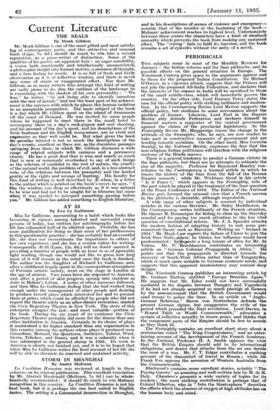PERIODICALS Two subjects recur in most of the Monthly Reviews
for January : the Indian reforms and the Saar plebiscite, and its possible effects on the general situation in Europe. The Nineteenth Century gives space to the arguments against and to those for the proposed Indian Constitution. Sir Michael O'Dwyer, in a vigorous attack, suggests that the Princes will not join the proposed All-India Federation, and declares that the interests of the masses in India will be sacrificed to those of the small middle-class, which will henceforth govern the country. On the other, side, Lord Eustace Percy states the case for the official policy with striking brilliance and modera- tion. In the Contemporary Review Lord Meston supports the official policy, but confesses to some nervousness about the problem of finance. Likewise, Lord Peel in the Empire Review ably defends Federation -and declares - himself in financial matters a supporter of the central government against the claims of the provincial legislatures. In the Fortnightly Review Mr. Muggeridge traces the change in the attitude of the Swarajists, who, he says, are now readier to take part in constructive measures of government and are tending towards socialikn. On the other hand, Miss Cornelia Sorabil, in the National Review, expresses the fear that the non-religious Indian politicians will interfere with the religious customs of the Hindu masses.
There is a general tendency to predict a German victory in the Saar plebiscite, but there are no attempts to estimate the size of the majority. Professor Sir Raymond Beazley con- tributes to the Contemporary a learned article in which he traces the history of the Saar from the fall of the Roman Empire onwards ; while Mr. Wickham Steed in his article " Is it Peace ? " which. appears in the Fortnightly, tells of the part which-he played inthe treatment of the Saar question at the Peace Conference of 1919. The Editor of the National Review puts forward the unusual view that a French success in the plebiscite is desirable, although -improbable.
A wide range of other subjects is covered by individual articles in the various- Reviews. Mr. Sisley Huddleston, in the Contemporary, writes brilliantly of the French situation. He blames M. Dournergue for failing to clear ap the. Stavisky scandal and for paying too much attention to the less vital question of constitutional reform. Mr. ;T: A. Spender attack" the modern fashion of adapting history to suit some pre-: conceived theory such as Marxism. Writing on " Ireland in 1934," Mr. Hugh Law regrets the failure of Ulster to join the Irish Free State, where, he thinks, her influence would have predominated : heitwets a long tenure of office for Mr. de Valera. Mr. P. Bruelthausen contributes an interesting article on " German Colonial Propaganda in Africa." He points out that the propaganda is directed towards the recovery of South-West Africa rather than of Tanganyika; which is much more suitable 'to German economic needs, and suggests that this apparent inconsistency may conceal deep designs.
The Nineteenth Century publishes an interesting article by Mr. Graham Hutton, entitled " Europe Breathes Again.' He suggests that Mr. Eden- could not have successfully, mediated in the dispute between Hungary and Yugoslavia if he had not already acquired so much prestige at Geneva by the announcement that the British Government would send troops to police the Saar. In an article on " Anglo. German- Relations," Baron von Stutterheim --defends the present German rciginte, but exaggerates the evils--of the period which preceded the Nazi revolution. Lord Davies, in Round Table or World Commonwealth," advocates a system of_ collective security to insure peace, and thinks that the component parts of the Empire should be free to accede as they think fit.
The Fortnightly contain_ s an excellent short story about a centenarian called " The King Congratulates," and an enter- taining account of the- development of the French Academy. In the National, Professor H. A. Smith opposes the view that the British Empire should add to its international obligations, and denies that attacks from the air can decide the issue of a war. Mr. C. T. Edgar contributes a scathing account of the disiomfort of travel in Russia ; while Sir Frank Fox opposes the secession of Western Australia from the Commonwealth.
Blackwood's contains some excellent stories, notably " The Paying Guesti," an amusing and well-written tale by M. de Daly. Chambers's presents a wide variety of topics for its readers ; the most striking contribution is perhaps that of Colonel Etherton, who in Into the Stratosphere describes the effects which the absence of oxygen at high altitudes has on the human body .and mind.






































 Previous page
Previous page